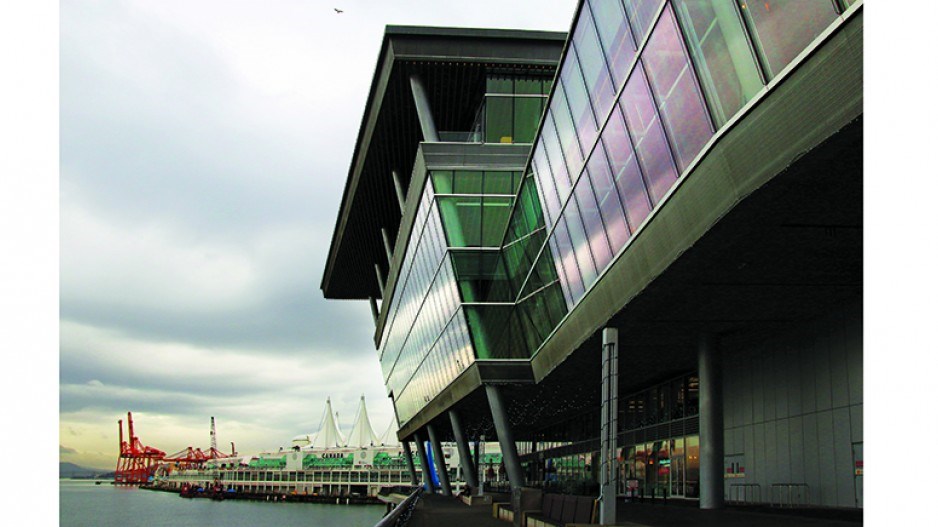Vancouver’s convention, sports and other major events venues are trying to adapt to COVID-19 restrictions by offering gatherings for smaller groups that don’t violate public health orders.
“It is frustrating, but I take solace in speaking with my colleagues around the world all dealing with the same issue,” said Claire Smith, vice-president of sales and marketing with the Vancouver Convention Centre (VCC) and the BC Pavilion Corp. (PavCo). “British Columbia’s situation is far more enviable than many other places in the world, and even within Canada, there are only a few provinces that allow more than 50 people to gather.”
PavCo – which owns and operates BC Place Stadium and the VCC – is scrambling to reschedule conventions slated for Vancouver this year.
Smith said the VCC has been able to move 48 events to other years, but it has also lost 129 that have been unable to fully commit to returning at a future date.
“It’s absolutely critical we keep Vancouver’s reputation as a premier convention destination, because we’ve worked on this for decades, developing relationships to bring events to Vancouver. And for major events, we are looking at $10 million for each event in terms of economic impact.”
In the meantime, PavCo is adapting.
BC Place, which is unlikely to host any BC Lions or Vancouver Whitecaps home games this year, in addition to seeing major acts like the Rolling Stones postpone their 2020 tour date, is reconfiguring its ground-level concourses and other spaces for smaller gatherings.
The VCC, meanwhile, is now the site of daily certification exams for skilled trades apprentices looking to start their careers.
Smith added that the medical equipment for a temporary emergency hospital also remains at the convention centre.
Other venues like Scotiabank Field at Nat Bailey Stadium – also empty for the summer as Minor League Baseball cancelled its season this summer – will also be looking at ways to adjust.
Vancouver Canadians general manager Allan Bailey has said the team will look at hosting movie nights or overnight camping on the field to compensate for the loss of game-ticket revenue, although it will not completely replace the holding of live games.
“One of the fun parts of what we do – of being in our industry – is about making things fun and safe for fans,” Bailey said. “So we will have come challenges to overcome, but we’ll find a new way forward. Part of it is, if we put on these events, you’d like to see something come back to us, but it’s also having the opportunity of some community involvement like helping charities or front-line workers. So we are looking at ideas and what could be feasible.”
Official figures for the economic impact on venues like Rogers Arena were not available from Canucks Sports & Entertainment, but Thomas Drance, senior writer for the Athletic, said the overall impact of not having fans at venues in a ticket-driven business like the National Hockey League (NHL) is one of the main reasons the league reported a $1.1 billion loss in projected revenue as a result of the COVID lockdown.
That figure is likely at least partially responsible for why the NHL and clubs like the Vancouver Canucks are eager to relaunch the season on August 1 at a neutral-site hub city.
“While this won’t help them recoup all of that, there’s a chunk of sponsorship dollars, broadcast money and advertising they will be able to earn,” Drance said. “So for a league that has had little to no revenue for months, the ability to generate revenue again helps stabilize things in an industry still looking at 12-months-plus in which they may not be able to generate revenue in the traditional way of gates and concessions sales.”
As for venues like the VCC without a sports-based tenant, Smith said the key is to maintain as much business as safety allows to preserve a facility that generates $450 million in economic activity annually in driving businesses to local retail, accommodations, restaurants and service suppliers.
“I think, in a lot of respects, we are a hidden industry,” Smith said. “A lot happens behind the scenes. Unless you are at a major event, you don’t necessarily think about how many people are involved and how many groups rely on that event. You may see a fan or a delegate walking the city, but typically we are not seeing all of the economic activity on any given day.
“So I believe the important message here is, we will meet again. The desire for people to come together and share experiences – to do business – is really fundamental. It may look different for the time being, but it doesn’t mean it’s going away.” •




